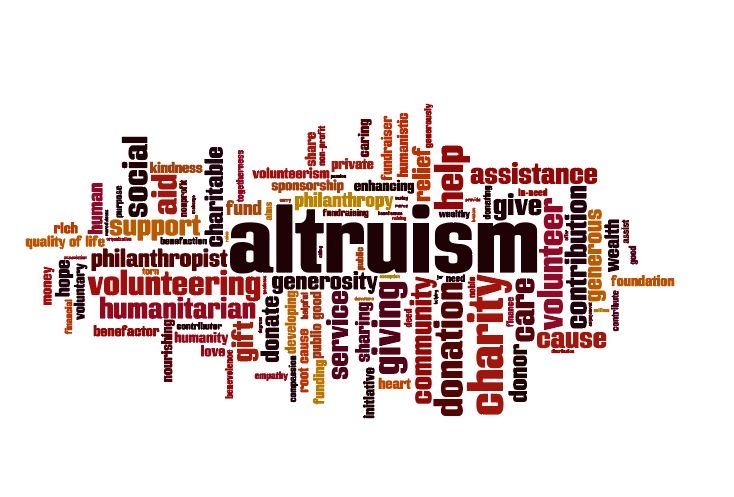Why We Should Exist For Utopian Altruism
 |
| Image Source: Psychiatric Times |
What is the meaning of life? Countless people have pondered the inquiry, but many are either perplexed by the seeming inscrutability of life or complacently settle on a preference. Can there actually be a "best" meaning of life?
The Question is Open-Ended
Existential purpose is an interpretive construct as opposed to an ascertainable concept. Therefore, it is impossible to definitively answer the question, because existential philosophies can never be empirically proven. This dichotomy between constructed beliefs and factual concepts may appear to discredit morality as an existential principle, but morality, as a subjective social construct, is devoid of both veracity and incredulity. It is because morality is an abstract social construct that, notwithstanding the subjectivity of moral existential philosophy, one can always posit a moral existential philosophy as the ethical basis for decision-making.
Morality Matters
Existential philosophy ought to be incumbent on moral principles and the rationale is simple. The reason humanity is even capable of conceptualizing reality is that humans are intelligent creatures. Additionally, the reason humanity is capable of enjoying reality is that humans are sentient creatures. Moral philosophy’s ability to label actions as “good'' or “bad” as a function of their emotional impact is consequently vital to facilitating society because, without morality, society devolves into an anarchy that prevents humans from experiencing the positive emotions they live for. Thus, the ultimate existential philosophy ought to morally consider both the intelligence and sentience of living entities.
Altruism is Amazing
Altruism is the ultimate existential philosophy because it accounts for both of these factors. Generally speaking, given a choice between feeling happy or feeling sad, it is better to feel happy. Altruism’s concern for the well-being of others respects sentience because pleasure, well-being's derivative, is intrinsically good and pain is intrinsically bad. Moreover, the positive effect altruism has on other people appeals to humanity’s intelligence by contributing to self-actualization, a fundamental desire of human psychology. Humans, as intelligent and sentient entities, can recognize when the happiness of others is a direct consequence of their actions and subsequently achieve self-actualization.
One may argue that altruism is not the only way to validate existence because it does not see society as an aggregate, instead prioritizing choices that are unimpactful in the long term. However, if altruism is ineffective holistically, that only means it needs to be reconceived as an effective existential philosophy that continues to respect the intelligence and sentience of the very humans who can debate its purpose. This self-defined form of altruism, which will be named "utopian altruism" for illustrative purposes, is "the belief in selfless concern to ethically pursue the complete well-being of society".
Utopian Altruism is the Best
It can still be argued that utilitarianism is superior to utopian altruism because utilitarianism pursues the most good for the most people, while utopian altruism pursues a nebulous goal of “complete well-being of society”. Even so, there is a critical distinction between utilitarianism and utopian altruism that favors the latter.
To elucidate this distinction, hypothetically say that a person is given the option to instantly eradicate all life to spare humans from their suffering. A mass euthanization plan would be radical, but its merit is that it would eradicate all pain, effectively eliminating the intrinsic “bad” of life. The problem is that erasing all the "bad" in life would simultaneously erase all the "good", which is appealing when the "bad" of society exceeds any "good" experienced by its members, but myopic in regards to the possibility of "good" increasing in the future. Essentially, even when life is painful, humanity should persist for the good that already exists and the potential for change.
While utilitarianism can satisfy this idea of persistence, by perpetually prioritizing the aggregate community, utilitarianism ignores the minority. Indifference to the minority compromises existential purpose because it overlooks the potential for change. In contrast, utopian altruism infinitely progresses toward a theoretical state-which shall be called “total utopia”-where everyone’s well-being is maximized. This is not to say that utilitarianism and utopian altruism are mutually exclusive, but utilitarianism can never achieve a total utopia where all intelligent and sentient entities are emotionally satisfied. Some may still argue that if most of society is happy and the minority is not, such a society supersedes a society where many people are unhappy. This assertion ignores that humanity can infinitely progress towards total utopia regardless of how far society has advanced.
What People Can Do
Now that it has been argued that utopian altruism is the ultimate existential philosophy, the methods for achieving total utopia should be outlined. Only broad principles can be described because it is virtually impossible to achieve total utopia due to complex sociopolitical issues, the difficulty of causing change, and the transience of human happiness.
First, all aspects of society that impede total utopia should be confronted over time. Solutions to better the world can then be executed by those industrious and innovative in society. The altruistic value of an endeavor can be roughly estimated by the total amount of long-term happiness it can induce. This “altruistic calculus” is a vast oversimplification, but the idea is to help society as much as possible. Note that any altruistic effort is beneficial.
Second, it must be emphatically clear that utopian altruism does not justify all means by the end those means result in. This deontological principle of utopian altruism exists because expediency jeopardizes the ethos of total utopia.
Finally, empathy is critical to utopian altruistic endeavors. Empathy is inextricably bound to the ability to understand happiness and therefore an indispensable quality of utopian altruists.

Comments
Post a Comment